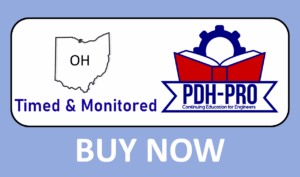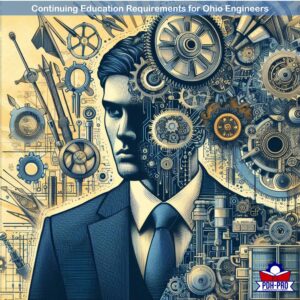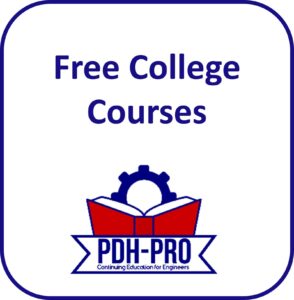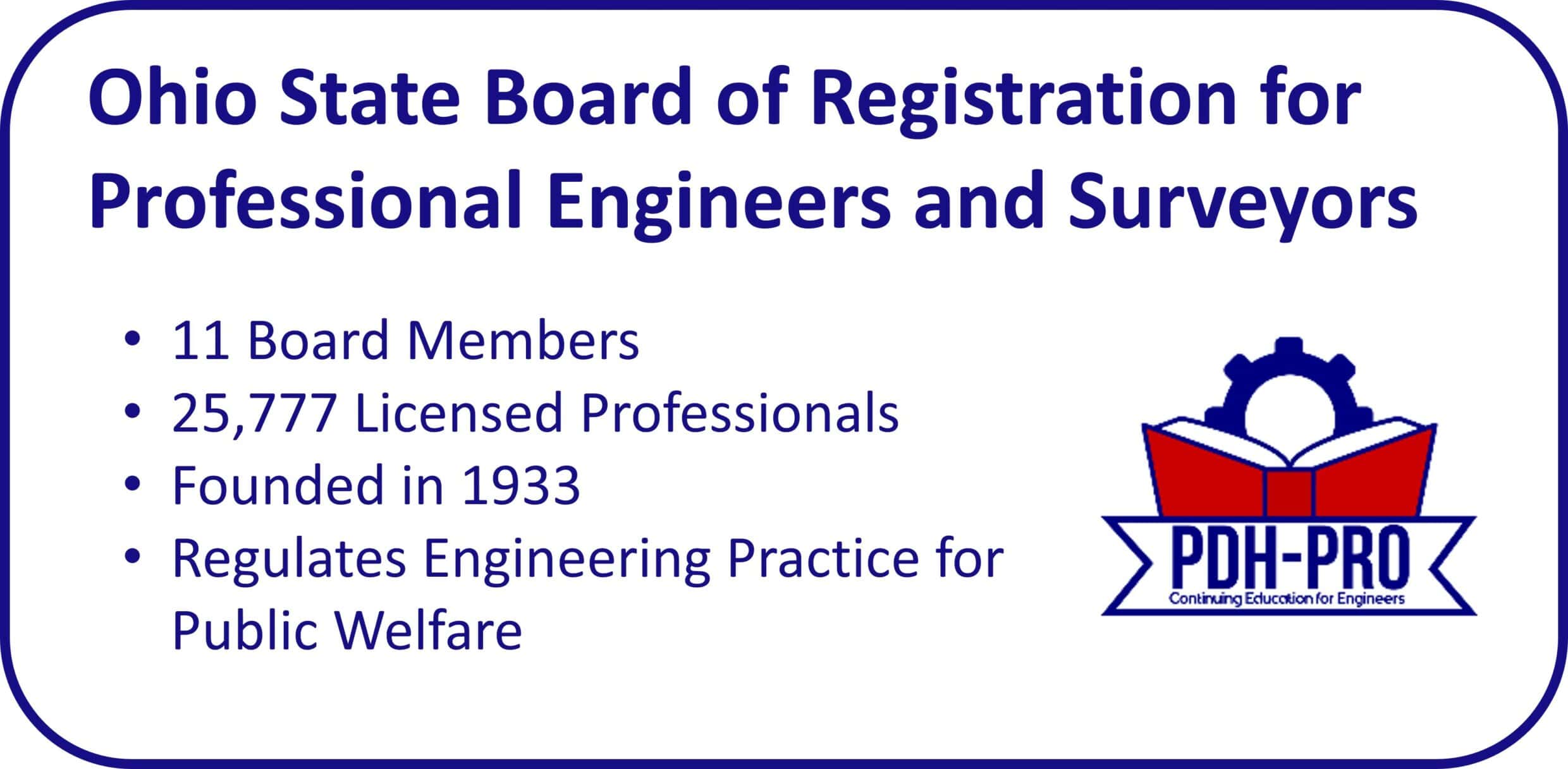CEU Requirements for Ohio Professional Engineers
Ohio PEs often ask us – What are the continuing education requirement for Ohio professional engineers?
Professional engineers in Ohio must complete 30 hours of continuing education classes biennially to renew their licenses. Two of those hours must be in professional ethics or the rules relevant to practicing engineering or surveying. Up to 15 hours earned in excess of the required 30 personal development hours (PDH)can be carried forward into the next two-year renewal cycle. The license renewal date is December 31 on odd numbered years.
PEs in Ohio can earn PDH credits by taking online continuing education courses that meet the Ohio engineering board requirements.
For a summary of all license renewal requirements check out our Ohio PE renewal page.
Ohio PDH Credits
The Ohio State Board of Registration for Professional Engineers and Surveyors (PEPS) administers engineering licensing in the State of Ohio.
PEPS mandates all Ohio professional engineers complete 30 hours of PDH biennially. Three hours of PDH annually can be done through correspondence courses. Two of the 30 biennial PDH must be on rules or professional ethics related to practicing engineering or surveying.
Pre-approval of the providers or courses by the board is not required and online courses. However, engineers are required to track the course hours and provide a completion certificate. Records from the courses must be kept for 4 years. All professional engineer license renewals must be done online.
CEU is known as Continuing Professional Development (CPD) in Ohio.
Ohio License Renewal Dates
The license renewal date for all professional engineers is December 31 on odd numbered years. Both PEs and professional surveyors must complete their 30 continued education PDH and send the board completion certificates and proof they attended the classes. All PEs must keep copies of attendance logs and completion certificates from their continuing education courses and activities for 4 years.
Engineering Ethics and Professional Conduct
Professional engineers in Ohio must take two continuing education PDH biennially in courses or activities delivering content that’s technical, ethical, or managerial and relevant to practicing engineering or surveying. They must be offered by reputable providers and deliver up-to-date, accurate, information on professional ethics, and relevant engineering or surveying rules and practices. Engineers may have to provide proof the information provided covering managerial skills was relevant to engineering or surveying practices.
Records Keeping Requirements for Engineers
Ohio PEs must keep attendance and completion records for all 30 PDH courses or activities for 4 years. The records must detail the courses or activities’ length, when and where they were held, the provider and presenter’s names and the number PDH earned. The engineer may have to present the data and other supporting evidence about the courses or activities completed to the board upon request to verify the engineer’s participation or for a random audit.
Continuing Education Activities Accepted by the Board
Activities accepted as continuing education PDH for professional engineers and surveyors include:
- Online courses
- Auditing or successfully completing courses relevant to practicing engineering or surveying.
- Completing continuing education courses, colleges, universities, professional or trade organizations or corporation offer that are relevant to practicing engineering or surveying
- Attending conferences, conventions, seminars or workshops relevant to engineering or surveying
- Completing online courses relevant to engineering or surveying
- Completing structured surveying or engineering related LEED coursework where verified class attendance generates hour-for-hour credit if coursework meets Ohio Law requirements
- Authoring published articles, books or papers
- First time teaching or instructing relevant workshops, seminars or courses
- Being an active committee member or Officer of engineering or surveying societies
- Attending satellite video courses where program materials meet requirements and attendance is verified
- Completing advanced instructional computer software courses to improve engineer’s or surveyor’s profession or business
- Completing spreadsheet courses incorporating and documenting surveying or engineering applications.
- Patents the year they are granted
- Live web seminars if attendance and participation are verified and confirmed
- Financial management courses
Non-Qualifying Courses and Activities
Courses and activities unacceptable as PDH for professional surveyors and engineers include:
- Elementary and entry-level training professional engineers and surveyors usually complete prior to registration
- Regular full-time employment
- Computer courses in word processing, presentation, spreadsheet, or web design software
- Real estate, foreign language or financial planning courses
- Attending trade show displays
- Topics not relevant to practicing engineering or surveying
- Personal self-improvement courses or activities
- Attending job-required business or general committee meetings
- Patents registered or articles, books or papers published before the applicable reporting period
- Speed reading courses
- Courses that are state-specific and based on policies, practices, laws and rules of another state
- Examinations
- Peer-reviewing articles, books, manuscripts and professional papers
Timed and Monitored Course for Ohio Engineers
For an online course to qualify, it must meet the conditions established in Ohio R.C. section 4733.151. Specifically, the course provider must track hours and certify completion. In addition, the course sponsor must provide a certificate of completion or other proof of attendance.
PDH-Pro offers a special course delivery format known as Timed & Monitored that meets the Ohio board requirements. Each course ensures the time spent learning the content matches the number of credits earned. A certificate of completion is provided after completing the course and passing an exam.
Pre-Approval of Continuing Education Activities
Continuing education courses, activities and providers for PDH do not have to be board pre-approved. Professional engineers or surveyors must know which courses or activities meet the board’s requirements.
Sources of Free Continuing Education Courses
 Professional engineers and surveyors can take free continuing education courses to fulfill their required biennial PDH through several websites.
Professional engineers and surveyors can take free continuing education courses to fulfill their required biennial PDH through several websites.
If you are a member of a professional society such as ASCE, ASME, or NSPE, you may be able to complete free continuing education courses as a member benefit.
Ohio Engineering Licensing
Becoming a professional engineer or surveyor is a four-step process. The applicant must earn a four-year engineering degree from an ABET-accredited engineering or surveying program. They must then pass the NCEES administered Fundamentals of Engineering (FE) exam. Candidates must then spend at least 4 years working under the supervision a professional engineer. Once the engineer has 4 years professional experience, the final step is passing either the NCEES administered Principles and Practice of Engineering (PE) exam.
Engineers or surveyors who successfully complete these four steps may apply for licensure in Ohio. The Ohio board has on online engineering license application process.
Engineering Discipline Restrictions
The Ohio engineering board does not restrict the courses in different disciplines PEs can take as part of their continuing education PDH. However, all PDH must be in ethical, technical or managerial material that’s accurate, up-to-date and relevant to practicing engineering or surveying.
Our Take on License Renewal
The PEPS board constantly works so when they renew their licenses biennially, professional engineers have the enhanced knowledge base, ethical background and professional skills to better serve the needs and protect the health and well-being of the public.

